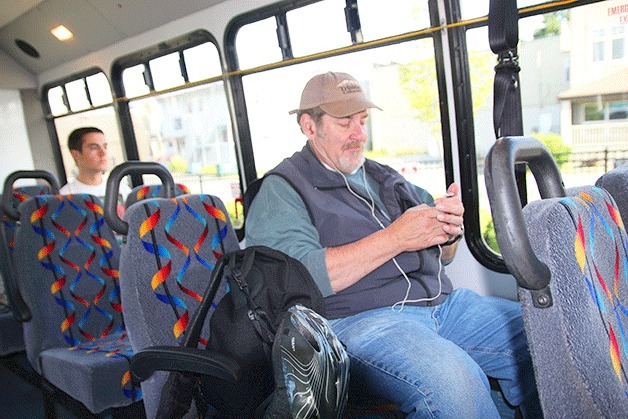If it wasn’t for Island Transit, Marty Corey might be out of a job.
The Anacortes resident has a “sick car” and said he relies on the bus service to get to work in Coupeville. The trip takes him about an hour and 45 minutes, but an iPod and the beautiful view make the ride pleasant.
“I used to spend $30 to $40 a week on gas,” he said. “The bus is much, much cheaper and environmentally friendly.”
Plus, he brings his bike along and gets in some exercise.
Likewise, Kirsten Tremmer takes the bus from Mount Vernon to Oak Harbor about four times a week for work. She said it saves her from driving her family’s gas guzzler.
The route over Deception Pass is part of a “tri-county connector” service, providing bus links between Island, Skagit and Whatcom counties; it’s become an important economic, as well as social, link between the three counties, according to Martha Rose, director of Island Transit.
The route, however, is in danger because of continued cuts in public transportation by state lawmakers; the state funding for the tri-county connector ends in July 2015 and lawmakers have told Rose that it’s not likely the money will be replenished.
The Everett connector, the popular route between Camano and Everett, ends this month because of a lack of state support.
It’s an issue making headlines regionally, especially with cuts likely for King County Metro.
“The state used to be the envy of the rest of the United States when it came to support of public transit,” Rose said. “Now it’s just 2 percent, which I think is shameful.”
The average state investment in transit in the nation is 23 percent of transit services, she said; the rest is mostly funded on the local level.
Island Transit had received about $3 million from the state to run the tri-county connector for two years, but the funding comes to an end June 30 of next year.
To prepare for the future, Rose said, Island Transit is implementing changes to routes proactively. The Route 411W bus will no longer run from Oak Harbor to Mount Vernon, where riders can connect to a Bellingham-bound bus.
As of June 30, the bus will stop at March Point in Anacortes and riders can transfer to a Skagit Transit bus, which will cost $1 per trip.
Island Transit offers fare-free service.
Four Route 4 buses will be eliminated, since the Route 411W bus will cover the same territory.
“It didn’t make sense to have one bus chasing another,” she said.
Rose, who spearheaded the creation of the regional routes, said the tri-county connected has been more successful than she dared to hope.
Initially, the transit officials thought the bulk of the ridership would be between Skagit and Whatcom, particularly the Interstate-5 corridor.
“To our complete delight, the research showed that Island Transit’s ridership was double the ridership combined with Skagit and Whatcom,” she said, “and our costs per rider and per mile were less, and yet our vehicle miles traveled more than double.”
In 2012, 147,000 Island Transit riders used the tri-county connector and 45,500 riders used the Everett connector, according to information provided by Island Transit.
The long-term future of the route, however, is uncertain.
Rose said she’s received many “heart-breaking” pleas from Camano residents about the loss of the Everett connector. A disabled man, for example, can’t keep his job in Everett and has to move in with his parents.
Rose said she’s in belt-tightening mode.
The agency pared a few low-ridership routes and isn’t filling a few positions.
The irony of the cuts for Island Transit is that the agency recently opened its new facility near Coupeville, which was largely funded by a $17-million federal grant, which could only be used for capital projects.
Under state law, Island Transit is maxed out at 9/10th of 1 percent sales tax funding, which was approved by voters.
“Transit agencies all over the state are seeing rising costs and diminishing support,” said Island County Commissioner Helen Price Johnson, who is on the agency’s board of directors.
Price Johnson and Rose say the solutions lie with the state legislature.
“I’m getting proactive on this,” Rose said. “I’m not being quiet and meek on this anymore.
“We need dedicated state funding for transit.”



